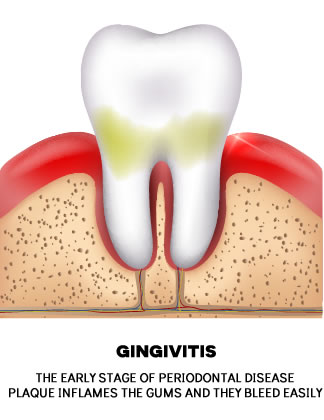Gingivitis – Is Mild Gum Disease Something You Should Be Worried About?

This early stage of gum disease is relatively common, so do we really need to be concerned about it?
At some point in our lives, most of us will probably have gum disease to some degree. In most cases this will probably be relatively mild and may produce little or no symptoms. This might occur when we are ill or when we neglect our teeth a little due to life being hectic (though even that shouldn’t really be an excuse!) . Usually when this is the case, it is soon reversed when we get back to our usual teeth cleaning regime.
Given that, in these situations, the gum disease is usually temporary, should we worry if we notice potential early signs of it? In today’s Blue Sky Dental blog, we take a look at this question and address any possible issues that might arise.
The three stages of gum health
Generally speaking, there are three main stages of gum health. The first is when our gums are clean and healthy, the second is when we start to show signs of gingivitis, the earlier stage of gum disease, and the third is when periodontitis occurs, a more aggressive and harmful stage.
Ideally, you should never reach the second stage and there is a lot that you can do to help with this. Good quality brushing with a toothbrush that is less than three months old and using dental floss on a daily basis is a good place to start. You should also see the hygienist at our Chelmsford dental surgery in order to have your teeth professionally cleaned with a scale and polish procedure every six months.
As previously mentioned though, few of us will manage to maintain a 100% record of good gum health so it is important to know what to do when it eventually strikes.
Gingivitis – the early stages
There are a number of potential signs that all is not well with our gums. If you notice any soreness or redness of your gums (as opposed to a healthy pink), or if you notice small amounts of blood when you spit after brushing your teeth, it may well be that gingivitis is present. There is no need to panic at this stage though and if you have eased off on your usual teeth cleaning regime, this may well be the reason why. If this is the case, try to pay more attention and brush and floss your teeth better to see if this improves things; if it doesn’t quickly, it is time to contact the dentist for reasons that we will see shortly.
It is possible that you won’t notice any symptoms at all in the early stages of gum disease. This doesn’t mean that you necessarily have a clean bill of health though. In order to maintain good oral health and healthy gums, we recommend that you see the hygienist on a six monthly basis so that your gum health can be checked and restored where necessary.
Periodontitis – Advanced gum disease
If you only have very mild symptoms of gum disease, you may think that it is not a major problem and that spitting a bit of blood every now and then is not a big issue. Whilst you might be able to live with some of these symptoms, it is a really bad idea to ignore any symptoms as these early signs that gum disease is present could mean that the problem will accelerate and become a much more significant problem that is very difficult to treat.
If you do notice signs of any gum health problems, do contact us for advice and don’t let the problem become more serious, allowing it to reach the stage known as periodontitis.
While gingivitis can be an uncomfortable problem, periodontitis is that and so much more. Whereas gingivitis typically affects only the soft gum tissue, periodontitis also affects the underlying bone structure that supports our teeth. It is an aggressive form of gum disease that attacks the bone and causes it to deteriorate. This in turn loosens its grip on the roots of our teeth and loose and wobbly teeth may start to become noticeable. Unfortunately, this is a problem that is difficult to treat and it may well result in some tooth loss.
While treatment for this problem is available in the form of a deep clean or root planing procedure, it is not always successful and tooth loss is still possible. For this reason we urge you not to allow the problem to reach this stage.
So, to answer the initial question of whether you should take action when you first notice any possible symptoms of early gum disease, the answer is a simple and definite yes. You should look at improving how you clean your teeth and definitely add flossing to your daily routine if you don’t already do so. You should also make an appointment to see the hygienist at our Chelmsford practice. If you would like to talk to us about your general oral health or to make an appointment with a dentist or hygienist, please call Blue Sky Dental today on 01245 211070.

Leave a Reply
You must be logged in to post a comment.